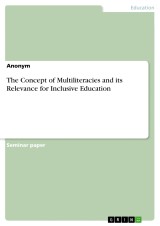Details

The Concept of Multiliteracies and its Relevance for Inclusive Education
1. Auflage
|
13,99 € |
|
| Verlag: | Grin Verlag |
| Format: | |
| Veröffentl.: | 10.04.2018 |
| ISBN/EAN: | 9783668680425 |
| Sprache: | englisch |
| Anzahl Seiten: | 12 |
Dieses eBook erhalten Sie ohne Kopierschutz.
Beschreibungen
Seminar paper from the year 2015 in the subject Didactics for the subject English - Pedagogy, Literature Studies, grade: 2,0, University of Frankfurt (Main), language: English, abstract: The similarities between the concepts of inclusion and multiliteracies — as understood by the New London Group — will be explored. The thesis that underlies this paper is that both approaches do possess a common ground, and the theoretical framework of multiliteracies and multiliteracy practices can play an essential role in inclusive approaches within the classroom. There is no aim here to put theory into practice: It is rather the comparison and merger of both concepts to find support for each another.
As a teacher engaged in the training of special education needs, I find it relevant to understand the connection of the concepts of multiliteracies and inclusive education to derive a basic but fundamental comprehension of benefits of multiliteracy practices in my work with students. My personal and professional understanding of inclusion does not exclude students without diagnosed special educational needs from my focus; on the contrary, it vigorously includes all students. Chapter Two concentrates on inclusive education by giving a brief definition of the term “inclusion” and what the central and essential ideas of inclusive education are. Chapter Three focuses on the concept of multiliteracies, its definition by the New London Group, and its implications for a new pedagogy shaped by theories of multiliteracies. Chapter Four brings together the findings concerning multiliteracy pedagogies and inclusive education to discusses the central question of whether the theory of multiliteracies does display any relevance for inclusive education, where these principles and mind-sets meet, and where the theoretical and practical implications of a theory of multiliteracies can be useful in an inclusive educational setting. The conclusion that follows sums up the results and reflects these, and displays possible consequences for further research.
As both concepts bear a complex and non-distinct definition, and given the limitations of this paper, only aspect and core elements of multiliteracies and inclusive education are provided.
As a teacher engaged in the training of special education needs, I find it relevant to understand the connection of the concepts of multiliteracies and inclusive education to derive a basic but fundamental comprehension of benefits of multiliteracy practices in my work with students. My personal and professional understanding of inclusion does not exclude students without diagnosed special educational needs from my focus; on the contrary, it vigorously includes all students. Chapter Two concentrates on inclusive education by giving a brief definition of the term “inclusion” and what the central and essential ideas of inclusive education are. Chapter Three focuses on the concept of multiliteracies, its definition by the New London Group, and its implications for a new pedagogy shaped by theories of multiliteracies. Chapter Four brings together the findings concerning multiliteracy pedagogies and inclusive education to discusses the central question of whether the theory of multiliteracies does display any relevance for inclusive education, where these principles and mind-sets meet, and where the theoretical and practical implications of a theory of multiliteracies can be useful in an inclusive educational setting. The conclusion that follows sums up the results and reflects these, and displays possible consequences for further research.
As both concepts bear a complex and non-distinct definition, and given the limitations of this paper, only aspect and core elements of multiliteracies and inclusive education are provided.
Diese Produkte könnten Sie auch interessieren:

Berufsorientierung in der Schule - ein Vergleich der Lehrplaninhalte von Wien und Berlin

von: Isabella Löffler

23,00 €















